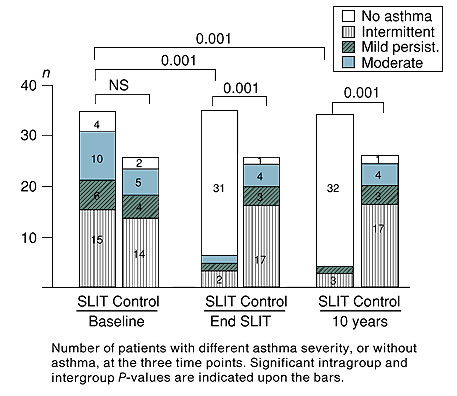Asthma is the most common chronic childhood disease, affecting more than 25 million Americans, causing 14 million out-patient visits, 500,000 hospitalizations, 2 million ER visits, and more than 4,000 deaths per year. On an average day, 40,000 people miss school or work due to asthma.
Asthma is a chronic inflammatory disease of the lower airway with classic symptoms that include:
- Wheezing relieved by a bronchodialator such as albuterol
- Cough
- Chest tightness
- Frequent respiratory infections
Allergen exposure, respiratory infections, air pollution including tobacco smoke, and exercise — particularly in cold weather — may make symptoms worse.
Some people experience symptoms a few times per year, particularly with acute exposure to mold, dust, grass, weeds, tree pollens, or animal dander — especially in the fall. For others, especially with dust mite and mold allergies, asthma symptoms may be experienced daily, debilitating and can be life threatening.
The only long-term way to prevent the long-term effects of asthma is to treat the underlying cause of the inflammation, such as avoiding tobacco exposure, or in the case of people with allergies, reducing allergen exposure and treating the underlying allergy with immunotherapy.
The recommended asthma treatment is:
- Reduce asthma triggers including dust mites, mold, pets and avoid tobacco exposure.
- Treat the underlying allergic inflammation cause with sublingual immunotherapy.
- Treat symptoms with daily inhaled corticosteroids with albuterol as needed. Increase medications as directed if symptoms continue or decrease if symptoms improve.
- A flu vaccination is strongly recommended.
Research
Research shows sublingual immunotherapy can benefit asthmatics with underlying allergy. A study of 60 children with asthma due to dust mites showed a dramatic difference in asthma medication use between the treatment group and the control group.1 This benefit lasted even four to five years after treatment stopped. Allergy Associates’ own research has shown that children with key risk factors who are treated with allergy drop immunotherapy show reduced rates of asthma developing. In 2013, the Agency for Healthcare Research Quality determined that evidence supports the safety and effectiveness of allergy drops for treating allergic rhinitis and asthma2.

1 Long-lasting effect of sublingual immunotherapy in children with asthma due to house dust mite: a 10-year prospective study, DiRienzo, et. Al. Clin Exp All, Feb 2003.
2 Allergen-Specific Immunotherapy for the Treatment of Allergic Rhinoconjunctivitis and/or Asthma: Comparative Effectiveness Review, Comparative Effectiveness Review No. 111. The Role of Immunotherapy in the Treatment of Asthma. Lin SY, et al. Agency for Healthcare Research and Quality (US); 2018 Mar.
Request an Appointment
